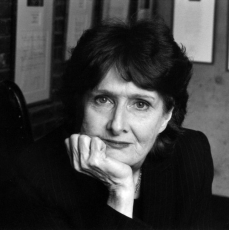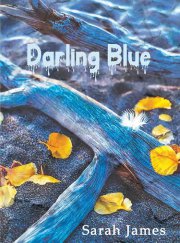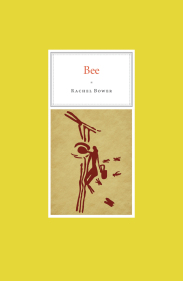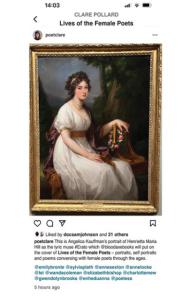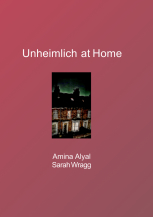
"I will be there"
A tribute to Eavan Boland (1944-2020)
The death of Eavan Boland has been met with great sadness and a sense of loss as profound as that explored in the majority of her poems. Her legacy is at present immeasurable but a great part of it will surely come to be seen as the restoration of lost stories; the recalling of lost voices; the resurrection of lost lives.
Evan Boland was overall a generous spirit – in both personal and professional terms. In her poetic and scholarly output she never sought self-aggrandisement; scores of tributes have recalled her unstinting support and encouragement of writers, young and old. As a teacher, she was endlessly patient with those who were also prepared to give of themselves and her family’s recollections are full of her concern for and love of her husband, children and grandchildren. As a friend, she was also loving and equally, briskly encouraging; she always had an engaging and occasionally boisterous sense of fun.
Never sentimental, she could be spiky and tricksy in response to questions from press or professional colleagues, with a wry perception of any self-importance or hidden agenda. Her inspiration and guidance of other writers was always perceptive and sharply discerning but she would never undermine a hesitant or awkward expression of creative activity. Not given to empty praise, she would nevertheless encourage putative writers with sound, no-nonsense, practical advice.
In her published work, initially 23 Poems when she was only 18 and her latest collection The Historians, to be published this coming Autumn, as well as numerous essays, edited collections and prose works, she was meticulous and again, generous, in her contribution to the understanding and appreciation of the art of poetry and its place in the world of the ordinary and the everyday.
I wish to focus here on her poetic output, in particular the process of recognition and exposure of repression of identity and the restoration and reconstruction of that identity in terms of place, history and literary tradition. In the Ronald Duncan lecture for the Poetry Book Society, she referred to "two identities" which "shape and reshape what I have to say...". She stated,
I am an Irish poet and a woman poet. In the first category I enter the tradition of the English language at an angle. In the second, I enter my own tradition at an even more oblique angle. (Boland)
A profound irony underlies this dual identity, as both “tradition[s]”, politically and poetically, have colonised place, history and literary establishment in their exclusion of women. The imagery of entry in itself expresses the importance of place in Boland's writing; a natural reflection of her response to her world is to present herself and others, past and present, as moving into place: physically and psychologically. In a 1998 interview, she champions and articulates the physical place she and most other women have occupied: “the suburban life...not to see through its circumstances to its vision and power and importance seems to me both wrong and illogical." The “circumstances” of such a life are such which have enabled those in authority to keep women “in their place”, literally in the domestic setting, metaphorically in the psychological place of the repressed, the ignored, the discounted. By conveying the vision and power of this setting, Boland restores and reconstructs the significance of the identity of those who inhabit it.
Like many others in late 20th and early 21st century modernist and post-modernist writing, Boland has made a notable contribution to ‘herstory’ by recovering and recreating women’s presence, in the past of the Irish nation. She has concentrated on the untold stories, the domestic context and the resilience and recuperative powers of those whose identity has been repressed in favour of the more evidently political figures: overwhelmingly, predominantly male.
Telling the Irish women’s story is Boland’s particular mission throughout her work, clearly evident in her collection Outside History and subsequent volumes but indicated in the very first. Her specific strategy for achieving this is the empathetically imaginative inhabiting of past lives: identification with those whose histories are unrecorded. She muses and meditates on buildings, furniture, clothing, jewellery; scraps of material evidence of former lives from which she draws out potential possibilities; she recreates flesh and blood characters from hints and whispers others would ignore or dismiss.
She establishes histories from what cannot be seen; what has not been recognised or acknowledged as significant; what is not recorded on maps or in official documentation. She is a witness who verifies the unspoken testimony of incidents and situations not considered relevant to the national narrative; although distant in time, she is present in imaginative sympathy and voices the stories of those silenced by the ignorance and prejudice of internal colonisation.
Boland referred in 2007 to the Irish in the nineteenth century, “…being humiliated in the language and idiom of British power” and she considers it a “… great thing for Irish writers…to take that language and make it tell the Irish story.” As an Irish poet, her reference to language is crucial. Throughout the collections Boland naturally uses terms such as “voice”, “words”, “song”, “music”, “story”, “language” and similar lexis, as she is so absorbed in the concept of verbal expression; so passionately alert to nuances of sound and articulation. The marginalisation and colonial repression of those without access to such vocalisation denies their identity. A survey of her work offers fascinating insights into the development of her poetic voice, progressively creating a voice for those previously ignored and unheard; thus restoring and reconstructing that identity.
Boland has gradually developed, established and extended her own identity as an Irish poet, using the English language and acknowledging yet departing from its literary heritage. Having employed fairly traditional form, structure and content in her first two collections, utilising conventional rhythm and rhyme, she moved to a narrow, restricted stanzaic pattern in In Her Own Image and Night Feed, exploring previously unacceptable content and context. Then in later volumes, such as The Journey, she has developed her own “angle”, an exciting plurality of form and a challenge to traditional structures; using unrhymed quatrains, incomplete sonnets, content inappropriate to the conventional ‘aisling’ poem. In her sixth collection, In A Time of Violence (1994), she broke through to a new style, meditative, sequential yet fragmented, in “Anna Liffey”, a longer, more extended poetic expression of her “shaping and reshaping” and in the following volumes she has continued to subvert the modes and techniques of the English language; gaining the confidence to acknowledge the irony of using the ‘language of the colonists’; extending her formal experimentation in the fragmented stanzas in several poems in A Woman without a Country, published in 2014.
A further service Boland has offered and another responsibility she has shouldered is her involvement in the re-establishment of women’s artistic creativity as essential to the cultural development and literary milieu of her nation. She has taken an active yet not militant part in restoring respect and appropriate esteem for women’s contribution to the Irish literary establishment. She has reached back past the Bardic tradition to the potent influence of folk-tale and women’s preservation of the narrative tradition through the subtleties and inferences of understated communication. Looking back over only her own lifetime, in 2007 Boland referred to her realisation that “People couldn’t connect their ideas of individualistic creativity with the responsibilities they felt a woman should have“.
In response to this inability, she has consistently usurped a variety of poetic genres and exposed the literary colonisation of production, publication and reception of poetry by women in the Irish cultural establishment. As she commented in 1994, “For a poet like myself, who comes into the tradition at an oblique angle, experiments of usurpation can be – they have been - exciting and rewarding.” They have also been exciting and rewarding for readers and encouraging to other writers: not only women; not only poets.
In her first full volume, New Territory, (1967) which Boland retained in her Collected Poems (2005), she uses relatively conventional form, structure and content; it is fascinating to see the early broaching of subjects to be rigorously destabilised later and to appreciate the distance travelled from this debut collection. Her awareness of place in this volume is expressed in terms of physical, geographical context; she begins to acknowledge the importance of women’s domestic history but does not explicitly interrogate the nationalist record; the place of women in artistic representation is commented on but not directly challenged.
In Boland's second collection The War Horse (1975), she is appropriating the ‘political’ poem and setting it in a domestic environment, traditionally the woman’s place, both geographically and psychologically. To place her life in those contexts of city, politics and poetics, yet not deny or belittle the suburban setting and the domestic routine, would be her mission in later collections and in that respect the context of the titular poem, “The War Horse” is significant : a suburban street, a new estate of houses built on land previously covered by fields and woods. The imagery is of broken plants in suburban gardens but the underlying tone of upheaval reflects the more sinister implications of the civil war conditions of the late 1960s in Northern Ireland, pervading the more settled South.
By the time she collated the poems for The War Horse, Boland was challenging the conventional myth of the nurturing but silent woman as a national ‘sybil’, totemic but ineffectual. The representative woman in Boland’s poetry is one who speaks for the ordinary and the everyday, elevating it to the universal, not through glorification or mystification but through the practicalities of sustaining home and family in a disruptive and disrupted environment. She expands her range of reference and comments on contemporary circumstances in the titular poem and others, as well as furthering the establishment of her identity as a woman poet by challenging the stereotypical depiction of woman’s place; exploring emotions and familial ties in reconstructing historical perspectives; and moving the figure of a woman from the periphery to the pivot of the later poems in the volume.
Boland's third collection, In Her Own Image (1980), has a more directly feminist stance. She started writing at a time which she described in an interview in 1979, when in poetry, "a woman’s body was at a safe distance, was a motif and not a menace…" In this volume she deliberately explores women's physicality and sexuality and defies the denial of this in the internal colonialism of Irish society, which has marginalised and repressed women's identity. Form and structure are radically different from her earlier work, she explained her desire to write “…the anti-lyric...I was very conscious of the fact that the lyric as I had known it had been a constraint on me as a woman”. The slender, stark, short-lined, elongated stanza is the predominant structure in this collection and parallels typographically the marginalisation of women’s identity which Boland is challenging.
The title of Night Feed (1982) continues Boland’s destabilising of the lyric form, and the title clearly indicates more domestic content in Boland's fourth collection and she extends her presentation of women's dual identities, as individuals responsible to themselves but also often ‘reduced’ to ‘only’ the responsibilities of the roles of mother and wife. As a result of various legislative marginalisations, colonialism in terms of exclusion had been practised. Boland's cultural contribution is to expose and rectify this marginalisation by recovering the multi-faceted identities of contemporary women.
The privilege of maternity is celebrated in these poems; the concept of a time reserved, dedicated to the mother-child bond. They establish the unique identity of the mother and capture the extraordinary sensitivity to nature and natural cycles which can only be fully appreciated as a corollary of the drudgery and containment of motherhood. Reflecting on these years in a 1989 interview, Boland explained, “I was aware that it was easier to have a political murder as the subject of an Irish poem than a baby or a washing machine.” As she further emphasised in 2001, she was living and writing “a life with a lot of dailiness, a lot of durable and true feeling. But I didn't see a reflection of it in the Irish poem” Her search for a reflection of this life and an establishment of it in her own work is continued in subsequent volumes.
In The Journey, (1987) nationalism has a much stronger presence than in earlier volumes, in the expression of women's dual personal and public roles, bringing the domestic realm into the political through poetic expression. Boland continues the theme of the importance of language and the need to tell the story of those who have been previously disregarded in historical record. She makes a distinctive contribution to the continuing vocal presence, throughout the nineties, of those whom Mary Robinson thanked in her victory speech at the beginning of the decade: “…the women of Ireland, mna na hEireann, who instead of rocking the cradle, rocked the system and who came out massively to make their mark on the ballot paper and on a new Ireland.”
In Outside History (1990) she further challenges and subverts the conventional form of the political poem. Through the small, apparently insignificant details that make up living history, rather than the static artefact, she celebrates the natural continuity beyond historical record and women's sensitivity to this. In an introduction to this collection for the poetry book society, Boland commented,
So much that matters, so much that is powerful and frail in human affairs seems to me, increasingly, to happen outside history…
She has clearly established a subversion of form and content, to bring those formerly ‘outside’ history inside, into the centre rather than banished to the margins.
The poems in the seventh collection, In A Time of Violence (1994), continue and extend the postcolonial aspect of Boland's work. The 'public' aspect of her considerations, the national as well as feminist consequences of colonialism, are exposed and more frequently intertwined than formerly. She has developed an exciting plurality of form to challenge traditional structures: using unrhymed quatrains, incomplete sonnets, content previously considered inappropriate to the conventional ‘aisling’ poem and reflecting her greater confidence in her own voice.
As she became more influential, more widely read and more overt in her speaking and teaching, her identities as Irish poet and woman poet were more closely aligned. Her children were becoming more independent, she was able to accept the position of director of the Creative Writing Programme at Stanford and thus both contributed to and encouraged others in the significant development of women’s writing.
Boland also exposes colonialism in the literary tradition of "fictive queens and national sybils"; its denial and repression of what she sees as the true identity of Irish women. Her words in an interview after the publication of In a Time of Violence seem to sum up her achievement and the concept of postcolonialism of place in her work; she has opened the way for other women poets to move in from the outskirts and find their place, as she positively asserts, "Poetry is not a fiefdom or a private domain. It is a city whose gates stand wide".
Boland’s means of creating a voice for the voiceless, telling the story of those who did not have the means or the permission to do so, continues persuasively in this volume, reflecting her concern still evident in an interview of 2007:
…some people - especially writers, especially women – had actually been silenced by the strictures and assumptions of …society. Either they felt intimidated, or unable to tell their story…they couldn’t find their voices.
Typically, Boland’s generous support of younger poets would enable them to avoid similar silencing; in the same interview she emphasised, “A young poet can quite easily fall into the trap of using high language, or ornamental diction, to protect him or herself from experience, rather than encounter it.”
The Lost Land (1998) is Boland's most directly 'postcolonial' volume, in its themes and language, the two sections being titled "Colony" and "The Lost Land". In an interview she recalled the genesis of the collection,
...the oppressions I could feel in the air were actually coming out of new formulations of ideas which, ironically, were meant to be about freedom: namely the postcolonial ones...how could ideas about exclusion allow themselves to be exclusive? (39)
In this volume, Boland demonstrates her confidence and authority in paring down the poetic form to essential words and phrases, often disjointed but never incoherent. Her identity as an Irish poet is still further established, as her political poems are more distinctly demarcated, reflected in the dedication, “For Mary Robinson – who found it”. The first Irish woman president, Robinson was at college with Boland and remained a lifelong friend.
By the 21st Century, Boland’s dual identities are secure: she confirms this as Code (2001) explores a variety of languages, ways of saying, means of expressing and affirming individual experience. Through symbols and signs, edging towards semiology, Boland continues to appropriate language and explore its more arcane dimensions, yet she still retains sufficient simplicity and directness to ensure the accessibility of her poetic output.
The poet’s role is frequently examined in this volume; in “Is it still the same”, she imagines a relatively naïve woman poet in the future encouraged by the supportive mentoring of an older, more experienced voice which comes to her from the past. The postcolonial stance in relation to exclusions of women’s voices has developed into a questioning of how the experiences of her early years of writing in a literary exile can be turned to good account in the inspiration of others. In an interview Boland stressed the importance of “recognising the need to redefine the permissions and the possibilities.” A typically supportive suggestion she made was recalled from her excellent series of workshops, a form of development of writers which she staunchly championed. Constant in her awareness of the hard work involved in creative practise, she suggested something the like of : “ don’t try to write a poem, write a line; if you can’t write a line, capture an image and this will lead you on the path to the poem.”
In her tenth volume, Domestic Violence, (2007) published 40 years after her first, New Territory, Boland’s two identities have become a dual identity, exploring concerns relating to the Irish poet and woman poet simultaneously. These are further examples of poems analysing and interrogating the Irish and English languages and the structure of the poems is vastly diverse, encompassing prose passages, poems divided into sections, three-lined verses, unrhymed couplets and an interesting return to rhyme in some instances. The central, abiding postcolonial concerns are still present, in terms of place and literary tradition, which she has exposed throughout her work.
Boland imagines herself explaining to the Shan Van Voch “poor old woman”, the conventional image of a personified Ireland, that ‘You were betrayed’, by the patriotic sentiments of poets such as James Clarence Mangan, whose poems are quoted in her own: ‘Yes! Ireland shall be free…’ Irish women have not had the luxury of that freedom, as Boland explained:
This conversation we've been having all these years in Irish poetry is not only about gender, but about freedom: who is free to write this poem? Who is free to call themselves an Irish poet? Who is free to return to the past and challenge and question it about exclusions?
Boland herself claims that freedom and celebrates the way in which Irish women’s poetry has recast the National Question:
…the feminine drew authority from the national in an Irish poem, and the national was softened and disguised through the feminine. I can't think of anything more disruptive to this old symmetry than that Irish women poets within a generation should alter that arrangement and break the terms of a long-standing contract.
In the most recently published collection, A Woman without a Country (2014), these central concerns remain and are further interrogated, particularly in terms of loss and the significance of language in retrieving at least the spirit of lost lives, through a number of poems which explore the etymology of words, reworking and subverting conventional phrases such as “salt of the earth”. She includes “Lesson[s]”, short prose poems which recall specific details of her own family’s past, to offer analogies for others’ ignored and unconsidered scraps of personal history. She also acknowledges the “shame” of her connection with an ancestor who was one of the “master[s]” implicated in the oppression and eviction of indigenous Irish labourers.
Another collection, The Historians, is to be published posthumously later this year. likely to open new ways into the past and its significance for the future, as did Boland’s poem written to celebrate the centenary of women’s suffrage in 2018: “Our Future Will Become the Past of Other Women”. Passionately concerned with the process of creativity as much as the outcome, she may well be remembered as much for the recognition and enhancement of others’ talent as the potent blazon of her own.
Despite the vastness of loss she has explored and that the literary world has suffered at her passing, her life and work can still be referred to in the present tense : Boland’s poems reiterate her poetic journey, in which she increasingly successfully disrupts, alters, breaks the bounds of political, social and poetic colonialism of history, place and literary tradition.
Fearlessly exposing implicit and insidious exclusion, she opens the way for her own “new Ireland”; for women poets in the future, she “will be there”.
Rose Atfield has worked in Higher Education for over 20 years, lecturing and writing on Irish literature, especially the work of Seamus Heaney and Eavan Boland. She established creative writing courses at Brunel University which have since attracted writers such as Fay Weldon, Celia Brayfield and Benjamin Zephaniah to the department.
